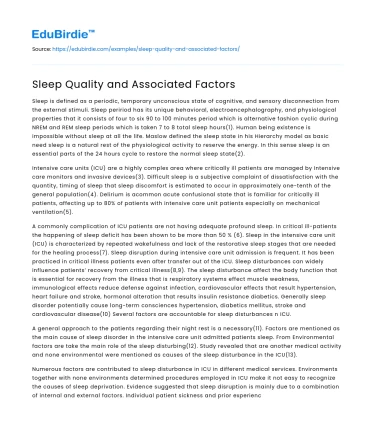Introduction
Sleep quality is a pivotal component of human health, influencing cognitive function, emotional well-being, and overall physical health. Despite its importance, many individuals struggle with achieving restorative sleep. This essay explores the multifaceted nature of sleep quality and the numerous factors that impact it, including lifestyle choices, psychological states, and environmental influences. By examining these determinants, along with existing research and real-life cases, we aim to provide a comprehensive understanding of how sleep quality can be optimized. Additionally, this discussion will address common misconceptions and counterarguments regarding sleep, ultimately reinforcing the thesis that improving sleep quality is achievable through targeted interventions.
Ensuring good sleep quality is not merely about increasing sleep duration but about enhancing the depth and continuity of sleep. As society becomes increasingly fast-paced, understanding the factors that contribute to sleep quality is crucial. From technological advancements to changing social norms, numerous modern developments have altered sleep patterns. This essay will delve into these aspects, offering insights and potential solutions to improve sleep health.
Save your time!
We can take care of your essay
- Proper editing and formatting
- Free revision, title page, and bibliography
- Flexible prices and money-back guarantee
Lifestyle Choices and Their Impact on Sleep Quality
Lifestyle choices play a significant role in determining the quality of sleep. Dietary habits, exercise routines, and substance use are critical factors that can either enhance or impede sleep quality. For instance, research has consistently shown that regular physical activity can lead to significant improvements in sleep quality. A study published in the journal Sleep Medicine Reviews suggests that individuals who engage in moderate-intensity exercise experience longer periods of deep sleep, reduced sleep onset latency, and fewer awakenings throughout the night (Kredlow et al., 2015).
Conversely, poor dietary habits, particularly the consumption of caffeine and alcohol, can severely disrupt sleep architecture. Caffeine, a central nervous system stimulant, can increase the time it takes to fall asleep and decrease sleep efficiency (Roehrs & Roth, 2008). Similarly, while alcohol may initially induce drowsiness, it can interfere with the sleep cycle, leading to fragmented sleep patterns. Therefore, adopting healthier lifestyle choices can substantially enhance sleep quality, making it a crucial area for intervention.
Moreover, the rise of digital technology has introduced a new challenge to achieving quality sleep. The ubiquitous presence of smartphones and other digital devices has led to increased exposure to blue light, which inhibits the production of melatonin, a hormone that regulates sleep-wake cycles (Chang et al., 2015). Thus, minimizing screen time before bed is an increasingly recommended practice for improving sleep quality. Despite these insights, skeptics argue that lifestyle interventions are insufficient in isolation and must be part of a broader, multifaceted approach to effect meaningful improvements in sleep quality.
Psychological Factors Influencing Sleep
Psychological factors are equally influential in determining sleep quality. Stress, anxiety, and depression are well-documented contributors to sleep disturbances. The relationship between mental health and sleep is bidirectional, with poor sleep exacerbating psychological distress and vice versa. An article in the journal Current Psychiatry Reports highlights the prevalence of insomnia among individuals with anxiety disorders, emphasizing the need for integrated treatment approaches (Harvey et al., 2011).
Cognitive Behavioral Therapy for Insomnia (CBT-I) has emerged as a highly effective treatment for improving sleep quality by addressing the cognitive and behavioral contributors to insomnia. CBT-I helps patients recognize and alter sleep-interfering thoughts and behaviors, resulting in sustained improvements in sleep quality. The success of CBT-I underscores the importance of psychological interventions in managing sleep disturbances, especially when lifestyle modifications alone are inadequate.
Despite the efficacy of psychological interventions, some critics argue that pharmacological treatments should take precedence due to their immediate effects. However, medications often come with side effects and do not address the root causes of sleep disturbances. A balanced approach that incorporates both psychological and pharmacological strategies may offer the most comprehensive solution, particularly for individuals with severe sleep disorders.
Environmental and Social Influences on Sleep
The environment in which one sleeps is another critical factor influencing sleep quality. Factors such as room temperature, noise levels, and light exposure can significantly impact the ability to obtain restful sleep. Research published in the journal Environmental Health Perspectives indicates that individuals exposed to noise pollution, such as traffic or industrial noise, experience increased sleep disturbances and reduced sleep quality (Basner et al., 2014).
To mitigate the effects of environmental disruptions, individuals can implement various strategies, such as using earplugs, blackout curtains, or white noise machines. Additionally, maintaining an optimal room temperature can prevent sleep interruptions due to discomfort. The National Sleep Foundation recommends a bedroom temperature of around 60 to 67 degrees Fahrenheit for optimal sleep.
Social factors, including work schedules and family responsibilities, can also influence sleep quality. Shift work, in particular, is associated with circadian rhythm disruptions, leading to poor sleep quality. As society moves towards a 24/7 economy, it is crucial to develop policies and interventions that support healthy sleep practices among shift workers. While environmental and social factors can be challenging to control, targeted interventions can help individuals create a conducive sleep environment, thereby enhancing sleep quality.
Conclusion
In conclusion, sleep quality is a complex phenomenon influenced by a myriad of factors, including lifestyle choices, psychological states, and environmental conditions. Addressing these factors through a combination of lifestyle modifications, psychological interventions, and environmental adjustments can lead to significant improvements in sleep quality. While some may argue that pharmacological treatments offer quicker results, they often fail to address the underlying causes of sleep disturbances.
Ultimately, a holistic approach that incorporates multiple strategies is essential for optimizing sleep quality. By understanding and addressing the diverse factors that influence sleep, individuals can take proactive steps to improve their sleep health, leading to enhanced overall well-being. As research continues to evolve, it is crucial for individuals and healthcare providers to stay informed about the latest developments in sleep science to implement effective interventions for better sleep.






 Stuck on your essay?
Stuck on your essay?

